Professional Judgment's Impact on Financial Accounting Operations
VerifiedAdded on 2020/03/23
|6
|1935
|45
Report
AI Summary
This report delves into the critical role of professional judgment in financial accounting, emphasizing its impact on operational efficiency and decision-making processes. It begins by defining professional judgment as the application of acquired knowledge, experience, and ethical standards to complex financial issues, highlighting its significance in financial reporting. The report then analyzes the influence of professional judgment on the presentation of financial statements, emphasizing the need for experienced individuals and comprehensive documentation. It addresses potential issues arising from subjective judgment, advocating for regulatory measures to enhance transparency and reliability. The report further examines the application of professional judgment in specific areas, such as accounting policy selection, depreciation methods, and construction contracts, with a particular focus on the Australian context and the guidelines set by the Australian Accounting Standards Board (AASB). The report underscores the importance of professional judgment in the effective implementation of professional standards. The report concludes by summarizing the challenges and importance of professional judgment in enhancing organizational productivity and decision-making. It highlights the need for documented information to support judgments and maintain the credibility of financial reporting.
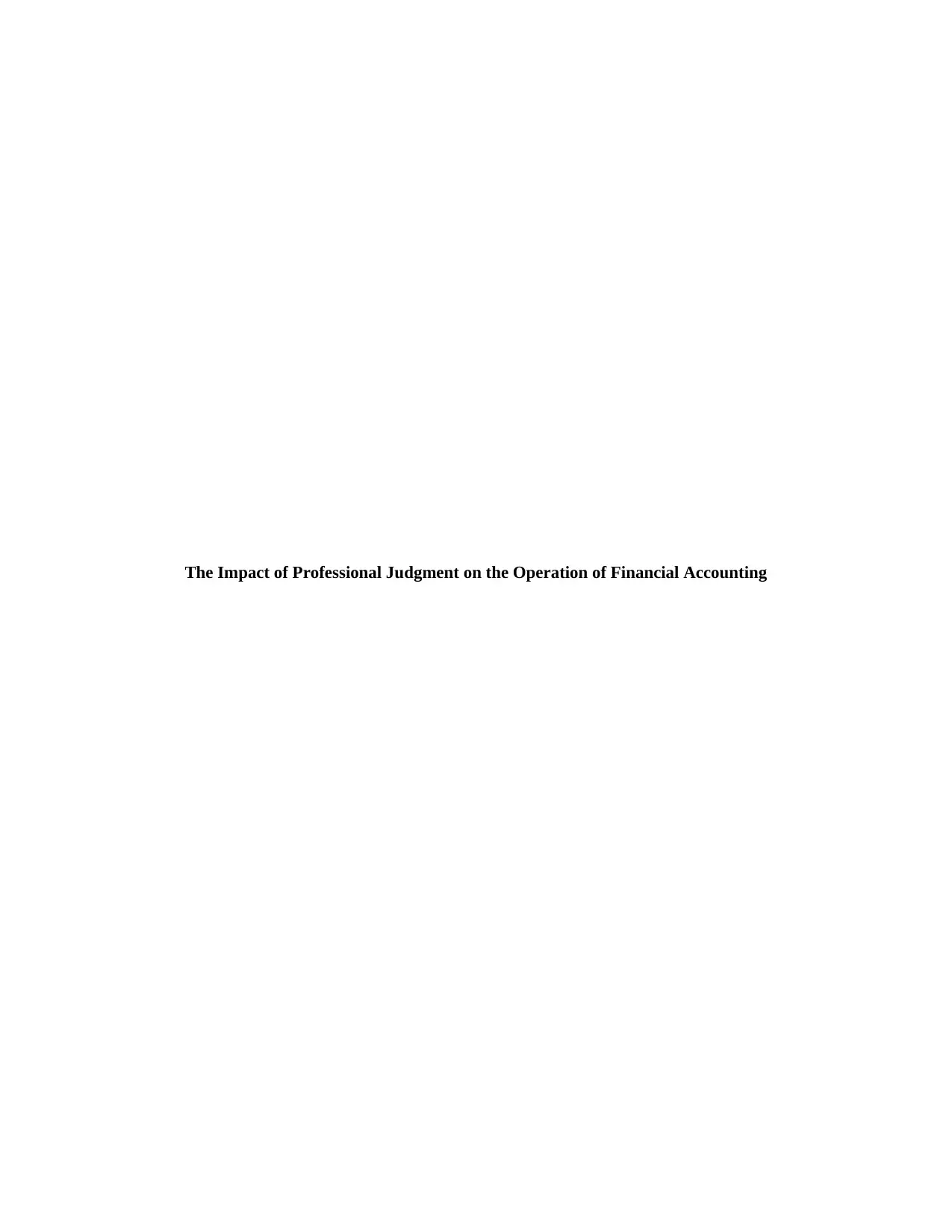
The Impact of Professional Judgment on the Operation of Financial Accounting
Paraphrase This Document
Need a fresh take? Get an instant paraphrase of this document with our AI Paraphraser
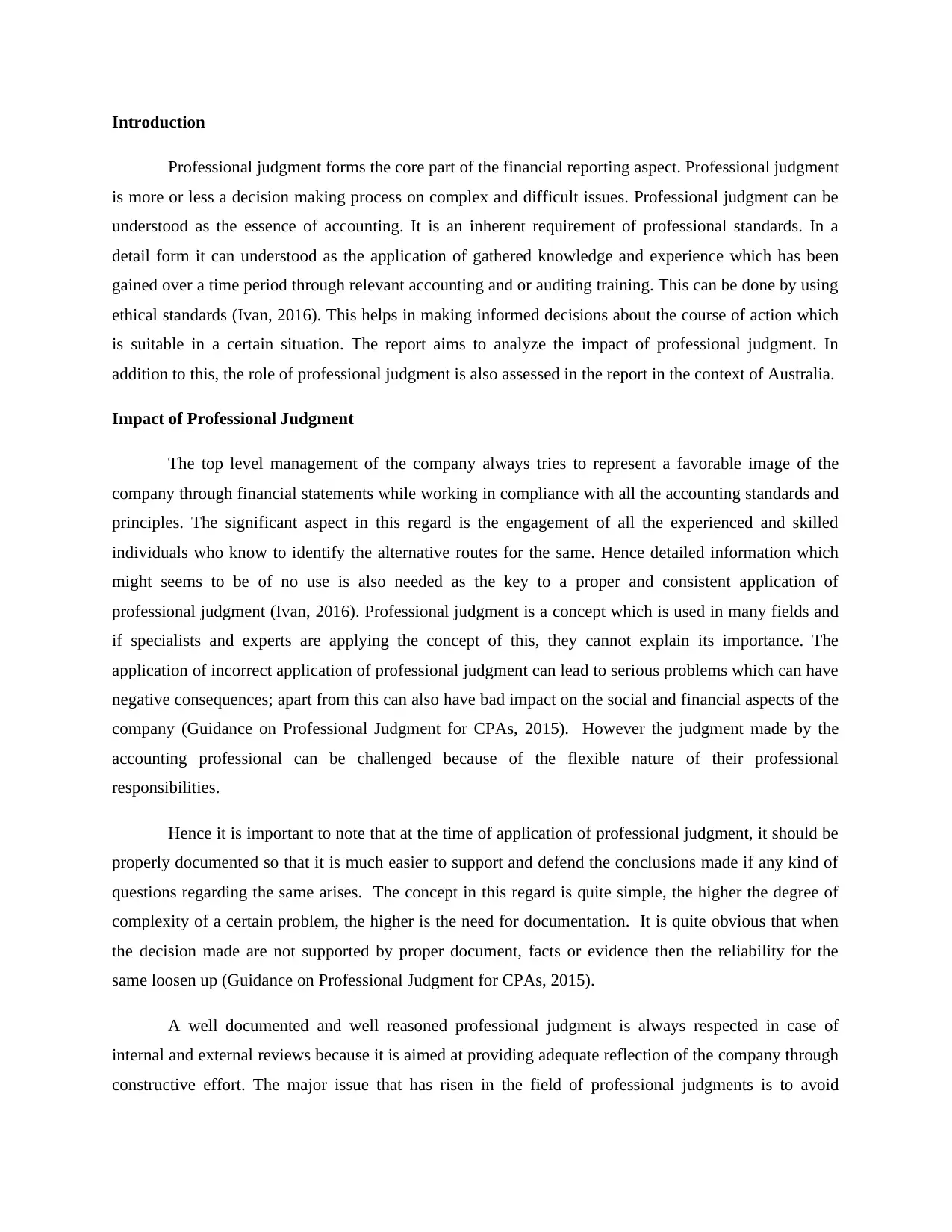
Introduction
Professional judgment forms the core part of the financial reporting aspect. Professional judgment
is more or less a decision making process on complex and difficult issues. Professional judgment can be
understood as the essence of accounting. It is an inherent requirement of professional standards. In a
detail form it can understood as the application of gathered knowledge and experience which has been
gained over a time period through relevant accounting and or auditing training. This can be done by using
ethical standards (Ivan, 2016). This helps in making informed decisions about the course of action which
is suitable in a certain situation. The report aims to analyze the impact of professional judgment. In
addition to this, the role of professional judgment is also assessed in the report in the context of Australia.
Impact of Professional Judgment
The top level management of the company always tries to represent a favorable image of the
company through financial statements while working in compliance with all the accounting standards and
principles. The significant aspect in this regard is the engagement of all the experienced and skilled
individuals who know to identify the alternative routes for the same. Hence detailed information which
might seems to be of no use is also needed as the key to a proper and consistent application of
professional judgment (Ivan, 2016). Professional judgment is a concept which is used in many fields and
if specialists and experts are applying the concept of this, they cannot explain its importance. The
application of incorrect application of professional judgment can lead to serious problems which can have
negative consequences; apart from this can also have bad impact on the social and financial aspects of the
company (Guidance on Professional Judgment for CPAs, 2015). However the judgment made by the
accounting professional can be challenged because of the flexible nature of their professional
responsibilities.
Hence it is important to note that at the time of application of professional judgment, it should be
properly documented so that it is much easier to support and defend the conclusions made if any kind of
questions regarding the same arises. The concept in this regard is quite simple, the higher the degree of
complexity of a certain problem, the higher is the need for documentation. It is quite obvious that when
the decision made are not supported by proper document, facts or evidence then the reliability for the
same loosen up (Guidance on Professional Judgment for CPAs, 2015).
A well documented and well reasoned professional judgment is always respected in case of
internal and external reviews because it is aimed at providing adequate reflection of the company through
constructive effort. The major issue that has risen in the field of professional judgments is to avoid
Professional judgment forms the core part of the financial reporting aspect. Professional judgment
is more or less a decision making process on complex and difficult issues. Professional judgment can be
understood as the essence of accounting. It is an inherent requirement of professional standards. In a
detail form it can understood as the application of gathered knowledge and experience which has been
gained over a time period through relevant accounting and or auditing training. This can be done by using
ethical standards (Ivan, 2016). This helps in making informed decisions about the course of action which
is suitable in a certain situation. The report aims to analyze the impact of professional judgment. In
addition to this, the role of professional judgment is also assessed in the report in the context of Australia.
Impact of Professional Judgment
The top level management of the company always tries to represent a favorable image of the
company through financial statements while working in compliance with all the accounting standards and
principles. The significant aspect in this regard is the engagement of all the experienced and skilled
individuals who know to identify the alternative routes for the same. Hence detailed information which
might seems to be of no use is also needed as the key to a proper and consistent application of
professional judgment (Ivan, 2016). Professional judgment is a concept which is used in many fields and
if specialists and experts are applying the concept of this, they cannot explain its importance. The
application of incorrect application of professional judgment can lead to serious problems which can have
negative consequences; apart from this can also have bad impact on the social and financial aspects of the
company (Guidance on Professional Judgment for CPAs, 2015). However the judgment made by the
accounting professional can be challenged because of the flexible nature of their professional
responsibilities.
Hence it is important to note that at the time of application of professional judgment, it should be
properly documented so that it is much easier to support and defend the conclusions made if any kind of
questions regarding the same arises. The concept in this regard is quite simple, the higher the degree of
complexity of a certain problem, the higher is the need for documentation. It is quite obvious that when
the decision made are not supported by proper document, facts or evidence then the reliability for the
same loosen up (Guidance on Professional Judgment for CPAs, 2015).
A well documented and well reasoned professional judgment is always respected in case of
internal and external reviews because it is aimed at providing adequate reflection of the company through
constructive effort. The major issue that has risen in the field of professional judgments is to avoid
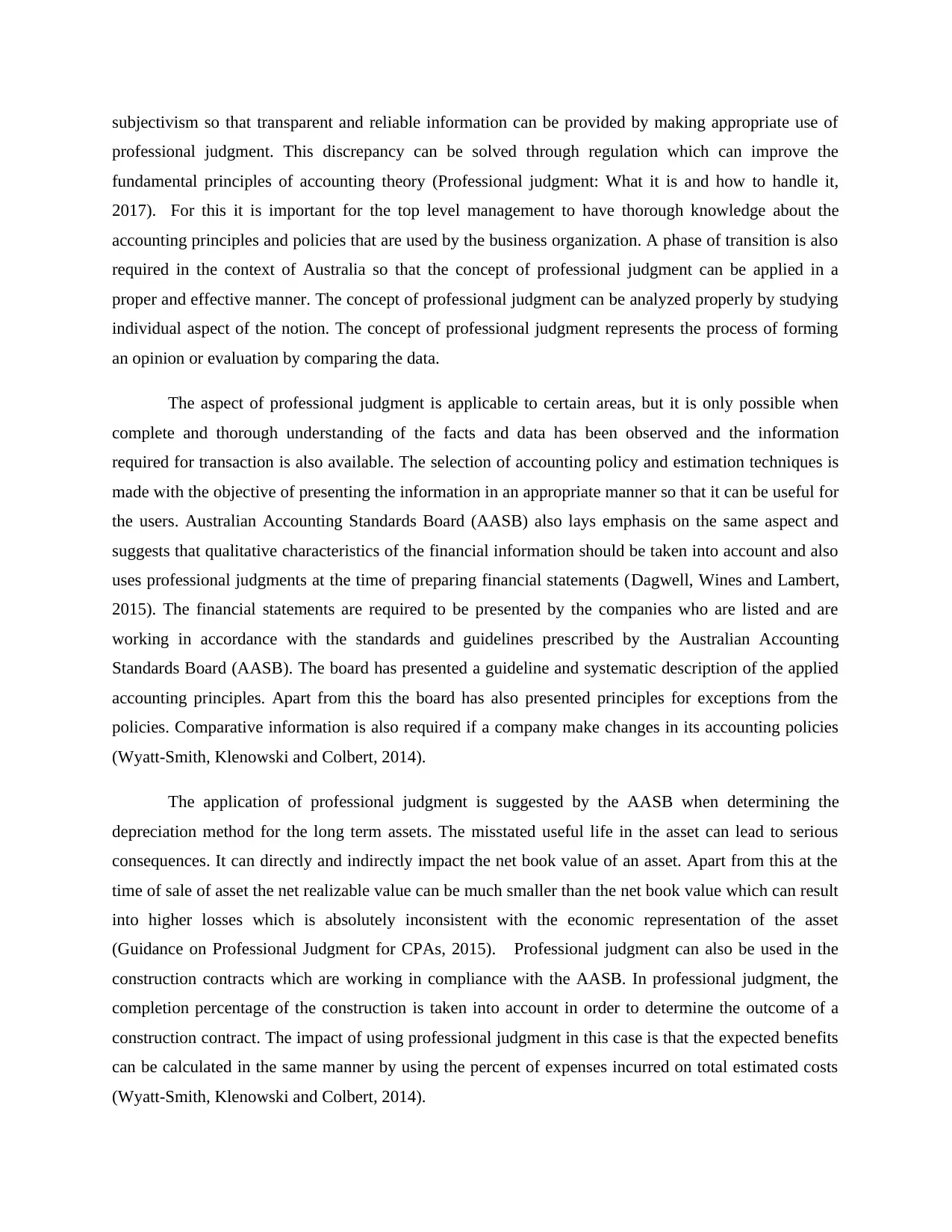
subjectivism so that transparent and reliable information can be provided by making appropriate use of
professional judgment. This discrepancy can be solved through regulation which can improve the
fundamental principles of accounting theory (Professional judgment: What it is and how to handle it,
2017). For this it is important for the top level management to have thorough knowledge about the
accounting principles and policies that are used by the business organization. A phase of transition is also
required in the context of Australia so that the concept of professional judgment can be applied in a
proper and effective manner. The concept of professional judgment can be analyzed properly by studying
individual aspect of the notion. The concept of professional judgment represents the process of forming
an opinion or evaluation by comparing the data.
The aspect of professional judgment is applicable to certain areas, but it is only possible when
complete and thorough understanding of the facts and data has been observed and the information
required for transaction is also available. The selection of accounting policy and estimation techniques is
made with the objective of presenting the information in an appropriate manner so that it can be useful for
the users. Australian Accounting Standards Board (AASB) also lays emphasis on the same aspect and
suggests that qualitative characteristics of the financial information should be taken into account and also
uses professional judgments at the time of preparing financial statements (Dagwell, Wines and Lambert,
2015). The financial statements are required to be presented by the companies who are listed and are
working in accordance with the standards and guidelines prescribed by the Australian Accounting
Standards Board (AASB). The board has presented a guideline and systematic description of the applied
accounting principles. Apart from this the board has also presented principles for exceptions from the
policies. Comparative information is also required if a company make changes in its accounting policies
(Wyatt-Smith, Klenowski and Colbert, 2014).
The application of professional judgment is suggested by the AASB when determining the
depreciation method for the long term assets. The misstated useful life in the asset can lead to serious
consequences. It can directly and indirectly impact the net book value of an asset. Apart from this at the
time of sale of asset the net realizable value can be much smaller than the net book value which can result
into higher losses which is absolutely inconsistent with the economic representation of the asset
(Guidance on Professional Judgment for CPAs, 2015). Professional judgment can also be used in the
construction contracts which are working in compliance with the AASB. In professional judgment, the
completion percentage of the construction is taken into account in order to determine the outcome of a
construction contract. The impact of using professional judgment in this case is that the expected benefits
can be calculated in the same manner by using the percent of expenses incurred on total estimated costs
(Wyatt-Smith, Klenowski and Colbert, 2014).
professional judgment. This discrepancy can be solved through regulation which can improve the
fundamental principles of accounting theory (Professional judgment: What it is and how to handle it,
2017). For this it is important for the top level management to have thorough knowledge about the
accounting principles and policies that are used by the business organization. A phase of transition is also
required in the context of Australia so that the concept of professional judgment can be applied in a
proper and effective manner. The concept of professional judgment can be analyzed properly by studying
individual aspect of the notion. The concept of professional judgment represents the process of forming
an opinion or evaluation by comparing the data.
The aspect of professional judgment is applicable to certain areas, but it is only possible when
complete and thorough understanding of the facts and data has been observed and the information
required for transaction is also available. The selection of accounting policy and estimation techniques is
made with the objective of presenting the information in an appropriate manner so that it can be useful for
the users. Australian Accounting Standards Board (AASB) also lays emphasis on the same aspect and
suggests that qualitative characteristics of the financial information should be taken into account and also
uses professional judgments at the time of preparing financial statements (Dagwell, Wines and Lambert,
2015). The financial statements are required to be presented by the companies who are listed and are
working in accordance with the standards and guidelines prescribed by the Australian Accounting
Standards Board (AASB). The board has presented a guideline and systematic description of the applied
accounting principles. Apart from this the board has also presented principles for exceptions from the
policies. Comparative information is also required if a company make changes in its accounting policies
(Wyatt-Smith, Klenowski and Colbert, 2014).
The application of professional judgment is suggested by the AASB when determining the
depreciation method for the long term assets. The misstated useful life in the asset can lead to serious
consequences. It can directly and indirectly impact the net book value of an asset. Apart from this at the
time of sale of asset the net realizable value can be much smaller than the net book value which can result
into higher losses which is absolutely inconsistent with the economic representation of the asset
(Guidance on Professional Judgment for CPAs, 2015). Professional judgment can also be used in the
construction contracts which are working in compliance with the AASB. In professional judgment, the
completion percentage of the construction is taken into account in order to determine the outcome of a
construction contract. The impact of using professional judgment in this case is that the expected benefits
can be calculated in the same manner by using the percent of expenses incurred on total estimated costs
(Wyatt-Smith, Klenowski and Colbert, 2014).
⊘ This is a preview!⊘
Do you want full access?
Subscribe today to unlock all pages.

Trusted by 1+ million students worldwide
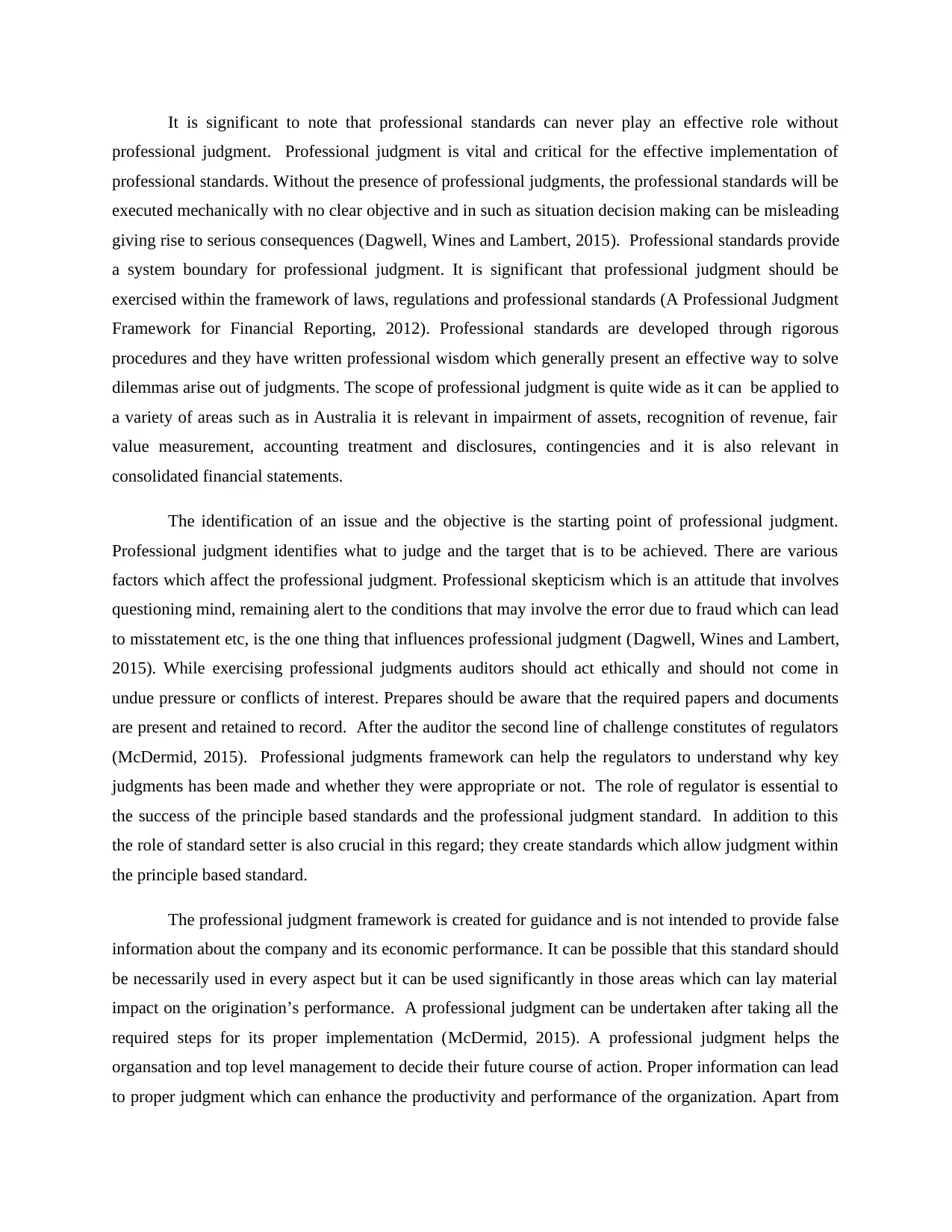
It is significant to note that professional standards can never play an effective role without
professional judgment. Professional judgment is vital and critical for the effective implementation of
professional standards. Without the presence of professional judgments, the professional standards will be
executed mechanically with no clear objective and in such as situation decision making can be misleading
giving rise to serious consequences (Dagwell, Wines and Lambert, 2015). Professional standards provide
a system boundary for professional judgment. It is significant that professional judgment should be
exercised within the framework of laws, regulations and professional standards (A Professional Judgment
Framework for Financial Reporting, 2012). Professional standards are developed through rigorous
procedures and they have written professional wisdom which generally present an effective way to solve
dilemmas arise out of judgments. The scope of professional judgment is quite wide as it can be applied to
a variety of areas such as in Australia it is relevant in impairment of assets, recognition of revenue, fair
value measurement, accounting treatment and disclosures, contingencies and it is also relevant in
consolidated financial statements.
The identification of an issue and the objective is the starting point of professional judgment.
Professional judgment identifies what to judge and the target that is to be achieved. There are various
factors which affect the professional judgment. Professional skepticism which is an attitude that involves
questioning mind, remaining alert to the conditions that may involve the error due to fraud which can lead
to misstatement etc, is the one thing that influences professional judgment (Dagwell, Wines and Lambert,
2015). While exercising professional judgments auditors should act ethically and should not come in
undue pressure or conflicts of interest. Prepares should be aware that the required papers and documents
are present and retained to record. After the auditor the second line of challenge constitutes of regulators
(McDermid, 2015). Professional judgments framework can help the regulators to understand why key
judgments has been made and whether they were appropriate or not. The role of regulator is essential to
the success of the principle based standards and the professional judgment standard. In addition to this
the role of standard setter is also crucial in this regard; they create standards which allow judgment within
the principle based standard.
The professional judgment framework is created for guidance and is not intended to provide false
information about the company and its economic performance. It can be possible that this standard should
be necessarily used in every aspect but it can be used significantly in those areas which can lay material
impact on the origination’s performance. A professional judgment can be undertaken after taking all the
required steps for its proper implementation (McDermid, 2015). A professional judgment helps the
organsation and top level management to decide their future course of action. Proper information can lead
to proper judgment which can enhance the productivity and performance of the organization. Apart from
professional judgment. Professional judgment is vital and critical for the effective implementation of
professional standards. Without the presence of professional judgments, the professional standards will be
executed mechanically with no clear objective and in such as situation decision making can be misleading
giving rise to serious consequences (Dagwell, Wines and Lambert, 2015). Professional standards provide
a system boundary for professional judgment. It is significant that professional judgment should be
exercised within the framework of laws, regulations and professional standards (A Professional Judgment
Framework for Financial Reporting, 2012). Professional standards are developed through rigorous
procedures and they have written professional wisdom which generally present an effective way to solve
dilemmas arise out of judgments. The scope of professional judgment is quite wide as it can be applied to
a variety of areas such as in Australia it is relevant in impairment of assets, recognition of revenue, fair
value measurement, accounting treatment and disclosures, contingencies and it is also relevant in
consolidated financial statements.
The identification of an issue and the objective is the starting point of professional judgment.
Professional judgment identifies what to judge and the target that is to be achieved. There are various
factors which affect the professional judgment. Professional skepticism which is an attitude that involves
questioning mind, remaining alert to the conditions that may involve the error due to fraud which can lead
to misstatement etc, is the one thing that influences professional judgment (Dagwell, Wines and Lambert,
2015). While exercising professional judgments auditors should act ethically and should not come in
undue pressure or conflicts of interest. Prepares should be aware that the required papers and documents
are present and retained to record. After the auditor the second line of challenge constitutes of regulators
(McDermid, 2015). Professional judgments framework can help the regulators to understand why key
judgments has been made and whether they were appropriate or not. The role of regulator is essential to
the success of the principle based standards and the professional judgment standard. In addition to this
the role of standard setter is also crucial in this regard; they create standards which allow judgment within
the principle based standard.
The professional judgment framework is created for guidance and is not intended to provide false
information about the company and its economic performance. It can be possible that this standard should
be necessarily used in every aspect but it can be used significantly in those areas which can lay material
impact on the origination’s performance. A professional judgment can be undertaken after taking all the
required steps for its proper implementation (McDermid, 2015). A professional judgment helps the
organsation and top level management to decide their future course of action. Proper information can lead
to proper judgment which can enhance the productivity and performance of the organization. Apart from
Paraphrase This Document
Need a fresh take? Get an instant paraphrase of this document with our AI Paraphraser
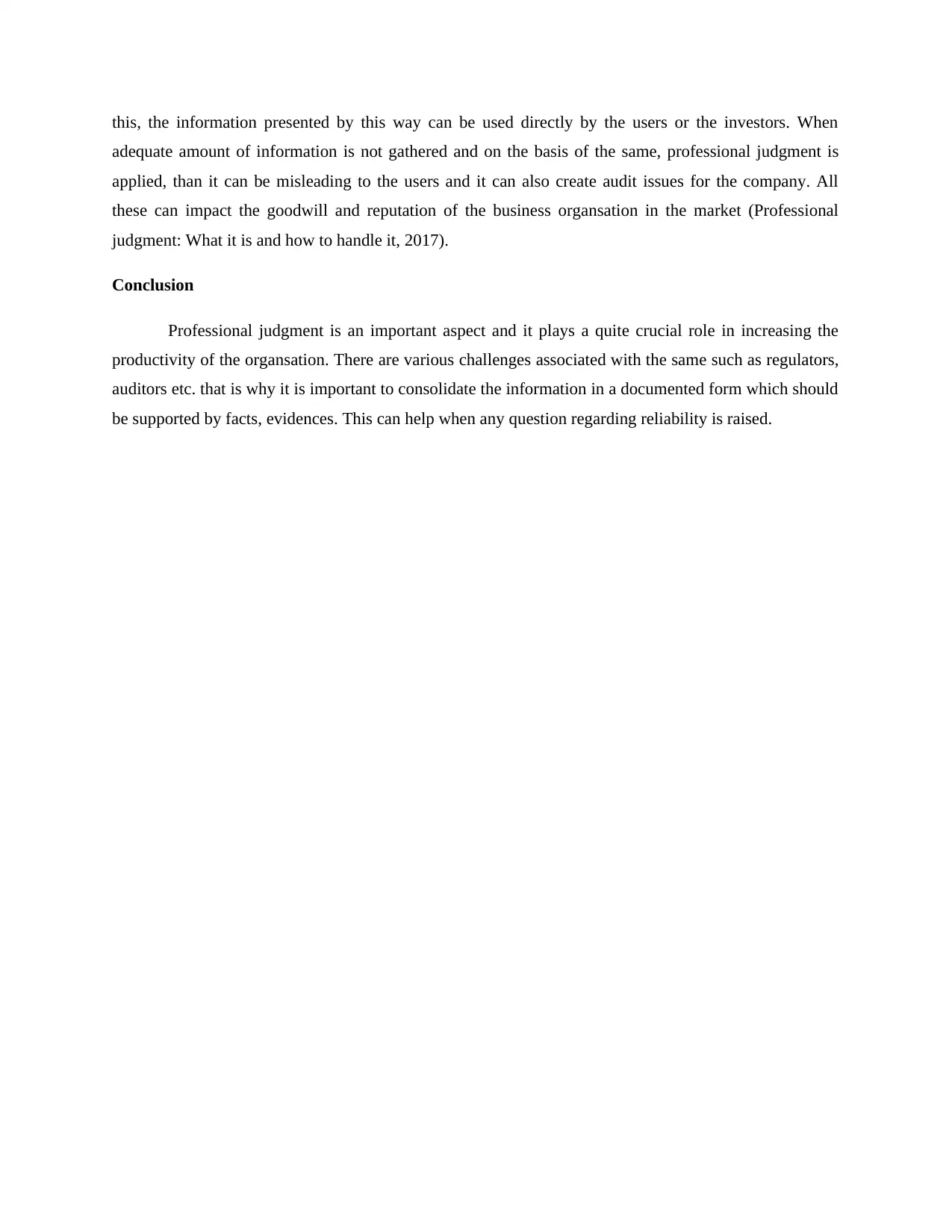
this, the information presented by this way can be used directly by the users or the investors. When
adequate amount of information is not gathered and on the basis of the same, professional judgment is
applied, than it can be misleading to the users and it can also create audit issues for the company. All
these can impact the goodwill and reputation of the business organsation in the market (Professional
judgment: What it is and how to handle it, 2017).
Conclusion
Professional judgment is an important aspect and it plays a quite crucial role in increasing the
productivity of the organsation. There are various challenges associated with the same such as regulators,
auditors etc. that is why it is important to consolidate the information in a documented form which should
be supported by facts, evidences. This can help when any question regarding reliability is raised.
adequate amount of information is not gathered and on the basis of the same, professional judgment is
applied, than it can be misleading to the users and it can also create audit issues for the company. All
these can impact the goodwill and reputation of the business organsation in the market (Professional
judgment: What it is and how to handle it, 2017).
Conclusion
Professional judgment is an important aspect and it plays a quite crucial role in increasing the
productivity of the organsation. There are various challenges associated with the same such as regulators,
auditors etc. that is why it is important to consolidate the information in a documented form which should
be supported by facts, evidences. This can help when any question regarding reliability is raised.
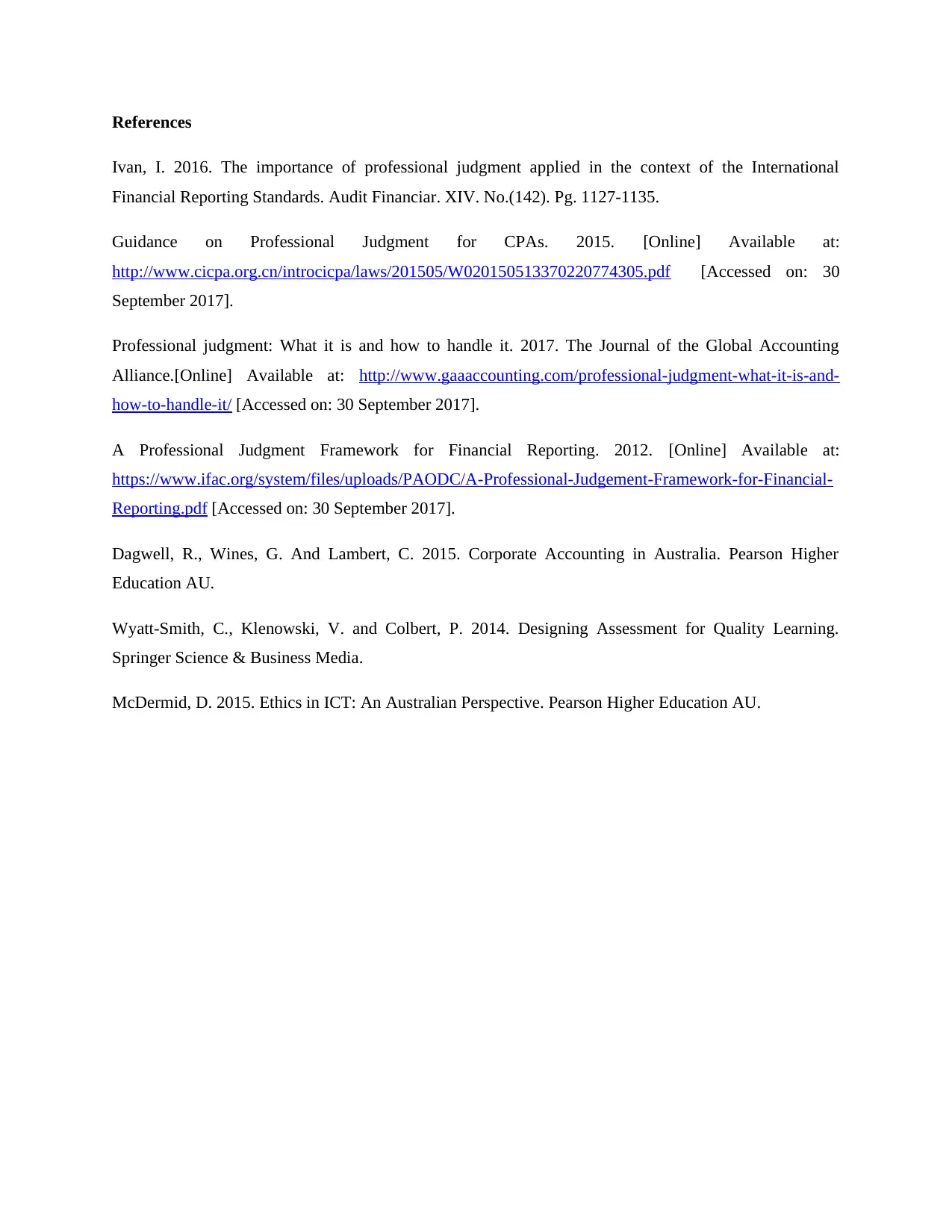
References
Ivan, I. 2016. The importance of professional judgment applied in the context of the International
Financial Reporting Standards. Audit Financiar. XIV. No.(142). Pg. 1127-1135.
Guidance on Professional Judgment for CPAs. 2015. [Online] Available at:
http://www.cicpa.org.cn/introcicpa/laws/201505/W020150513370220774305.pdf [Accessed on: 30
September 2017].
Professional judgment: What it is and how to handle it. 2017. The Journal of the Global Accounting
Alliance.[Online] Available at: http://www.gaaaccounting.com/professional-judgment-what-it-is-and-
how-to-handle-it/ [Accessed on: 30 September 2017].
A Professional Judgment Framework for Financial Reporting. 2012. [Online] Available at:
https://www.ifac.org/system/files/uploads/PAODC/A-Professional-Judgement-Framework-for-Financial-
Reporting.pdf [Accessed on: 30 September 2017].
Dagwell, R., Wines, G. And Lambert, C. 2015. Corporate Accounting in Australia. Pearson Higher
Education AU.
Wyatt-Smith, C., Klenowski, V. and Colbert, P. 2014. Designing Assessment for Quality Learning.
Springer Science & Business Media.
McDermid, D. 2015. Ethics in ICT: An Australian Perspective. Pearson Higher Education AU.
Ivan, I. 2016. The importance of professional judgment applied in the context of the International
Financial Reporting Standards. Audit Financiar. XIV. No.(142). Pg. 1127-1135.
Guidance on Professional Judgment for CPAs. 2015. [Online] Available at:
http://www.cicpa.org.cn/introcicpa/laws/201505/W020150513370220774305.pdf [Accessed on: 30
September 2017].
Professional judgment: What it is and how to handle it. 2017. The Journal of the Global Accounting
Alliance.[Online] Available at: http://www.gaaaccounting.com/professional-judgment-what-it-is-and-
how-to-handle-it/ [Accessed on: 30 September 2017].
A Professional Judgment Framework for Financial Reporting. 2012. [Online] Available at:
https://www.ifac.org/system/files/uploads/PAODC/A-Professional-Judgement-Framework-for-Financial-
Reporting.pdf [Accessed on: 30 September 2017].
Dagwell, R., Wines, G. And Lambert, C. 2015. Corporate Accounting in Australia. Pearson Higher
Education AU.
Wyatt-Smith, C., Klenowski, V. and Colbert, P. 2014. Designing Assessment for Quality Learning.
Springer Science & Business Media.
McDermid, D. 2015. Ethics in ICT: An Australian Perspective. Pearson Higher Education AU.
⊘ This is a preview!⊘
Do you want full access?
Subscribe today to unlock all pages.

Trusted by 1+ million students worldwide
1 out of 6
Related Documents
Your All-in-One AI-Powered Toolkit for Academic Success.
+13062052269
info@desklib.com
Available 24*7 on WhatsApp / Email
![[object Object]](/_next/static/media/star-bottom.7253800d.svg)
Unlock your academic potential
Copyright © 2020–2025 A2Z Services. All Rights Reserved. Developed and managed by ZUCOL.





